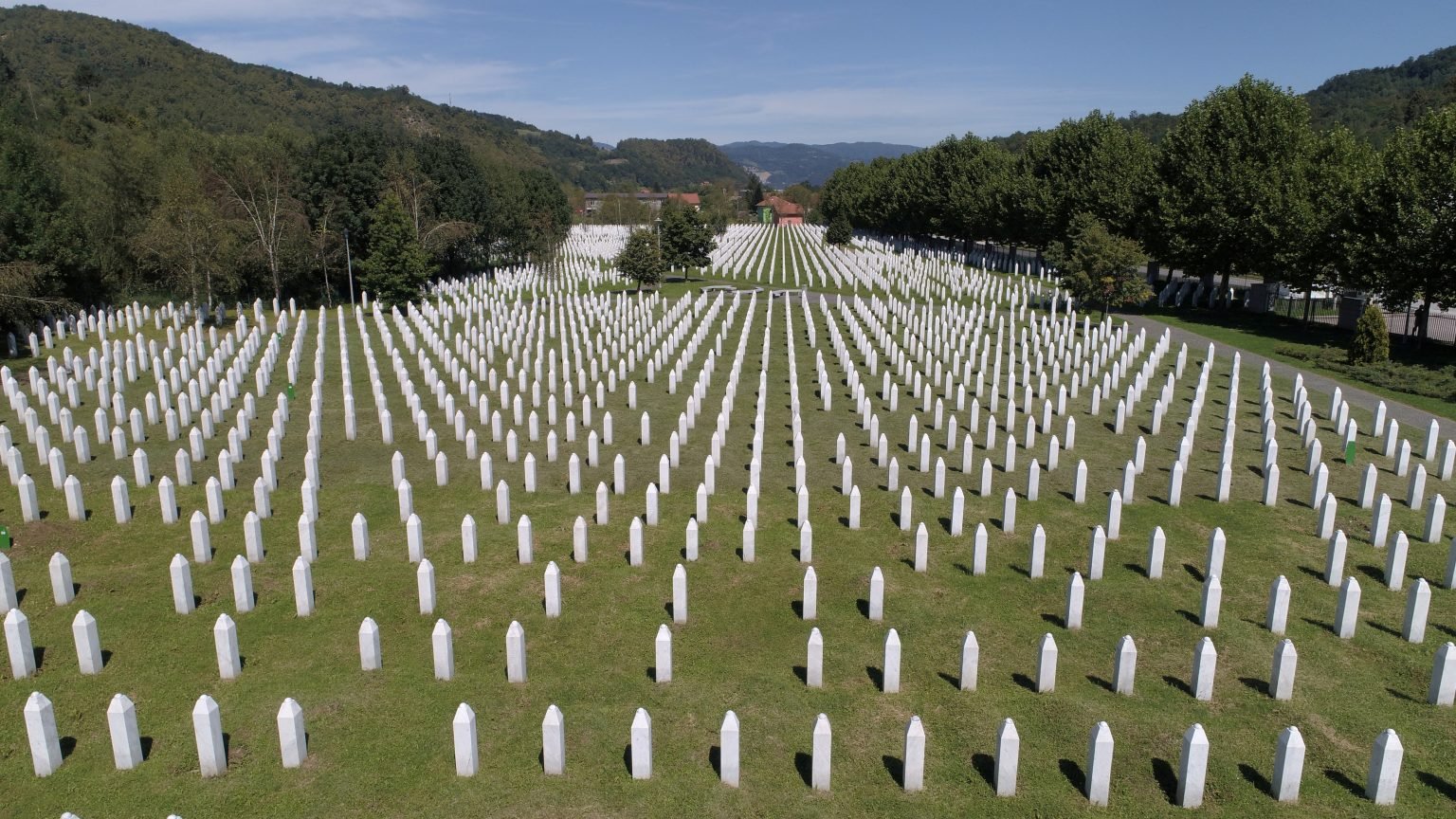On the 30th Anniversary of the Srebrenica Genocide: Manipulating Truth as a Strategy for the “Serb World”
Assoc. Prof. Dr. Arben Fetoshi
With only one or two bones found from each of the seven victims being buried today at the Srebrenica-Potočari Memorial Center, the 30th anniversary of the largest crime in Europe since World War II is being marked. Mevlida Omerović decided to end her long wait and bury only her husband’s jawbone, while in parallel to the Serbian rampage in Kosovo, hundreds of Albanian mothers still wait for any trace of their 1,600 missing loved ones.
The International Criminal Tribunal for the former Yugoslavia (ICTY), along with courts in Bosnia and Croatia, has issued hundreds of years in prison for those responsible for the genocide in Srebrenica, while Serbia continues to fight the battle of denial. The United Nations, where it is usually “victimized”, has declared July 11 the International Day of Reflection and Commemoration of the Srebrenica Genocide — but Serbia does not recognize it, despite being a signatory to the 1948 Convention on the Prevention and Punishment of the Crime of Genocide.
Denial as a Strategy for the “Serb World”
Despite Serbia’s deep political and cultural distortion as a result of a chauvinistic mindset rooted not only in its political elite, but also in the Orthodox Church — which glorifies war criminals — and its Academy of Sciences — serving as the ideological laboratory of the victimhood narrative — denial of the genocide and massacres in Bosnia and Kosovo is not simply a moral deviation or an electoral tactic. It is a calculated strategy to distort the truth and empower its expansionist policy. Admitting the truth would dismantle Serbia, its myth of innocence, and the deceitful narrative of victimhood. That is why denial functions as an instrument of the hegemonic “Serb World” project.
Aleksandar Vučić is not merely a political successor of Slobodan Milošević — he is a faithful ideological heir. In 1995, Vučić stated in the Serbian Parliament: “For every Serb killed, we will kill one hundred Muslims.” Although today, as president, he avoids political responsibility for the discourse of that era, his refusal to support the UN Resolution proves the ideological continuity embodied in the “Serb World” project.
The few rational voices in Serbia who denounce Vučić and the denial of genocide as political manipulation only tell half the truth. The issue is not only denial of crimes, but denial of the legal classification of genocide. At a rally against the UN resolution on April 18, 2024, Milorad Dodik described the actions of the Army of Republika Srpska as “a mistake” — acknowledging the crime, but rejecting the term genocide.
A Kremlin tool and US-sanctioned political leader, such as Dodik — who is indicted and criminally pursued by his own state — cannot “betray” the interests of the so-called Slavic brotherhood, which seeks:
- the destabilization of the Western Balkans;
- the erosion of the liberal-democratic order;
- the obstruction of Euro-Atlantic integration; and
- the promotion of anti-Western narratives.
Because, any reflection on the Srebrenica genocide would not only represent a retreat from separatist ambitions in Bosnia, but also a national catharsis and a form of denazification for Serbia — with far-reaching political, legal, and strategic implications.
Vučić as the Continuation of Milošević
Western tolerance toward Vučić, for the sake of stabilocracy and curbing Russian and Chinese influence in the Balkans, has enabled the revival of Milošević’s narrative of “Serbian victimhood”, now repackaged using the Russian model of “Firehose of Falsehood” against Kosovo, Bosnia and Herzegovina, Montenegro, and North Macedonia.
Due to shifting geopolitical priorities and the preference for political stability, both Bosniaks and Albanians have faced international pressure to accept a “reconciliation without justice”, but even this has not led to genuine recognition or normalization. In line with the goals of denying genocide in Bosnia, Serbia has also denied the war crimes and massacres committed in Kosova, branding them as “fabrications used to justify NATO’s intervention.”
Meanwhile, through ongoing disinformation campaigns and manipulative and inciting narratives — such as claims of “ethnic cleansing” of Serbs, “harassment of Serbian girls in the north,” or earlier fabrications about “crimes” committed by the KLA — Serbia has sought to:
- undermine the statehood of Kosovo;
- deepen ethnic divisions;
- manipulate international opinion and diplomacy; and
- challenge democratic order and Euro-Atlantic integration of the region.
Today, with the world gripped by expanding conflict, the risk of history repeating itself is no longer a metaphor. With Dodik’s separatist rhetoric in Bosnia and Serbia’s propaganda aggression against Kosova, the hybrid war continues — threatening to revive the horrors of the late 20th century.
Therefore, on this anniversary of the genocide in Srebrenica, it is important to tell the truth:
- Denial of genocide is a political strategy for the hegemonic project “Serbian World”;
- Denial of genocide inflicts renewed harm on the families of victims and survivors;
- Denial of genocide hinders transitional justice.
The pressure from the West to no longer tolerate Serbia’s rejection of international legal order, to admit its crimes, and to apologize for atrocities in Bosnia and Kosovo, is not merely a moral or symbolic demand, but a condition for security, stability, and a European future of the Balkans.
The author is the Director of the Octopus Institute for Hybrid Warfare Studies – Pristina

